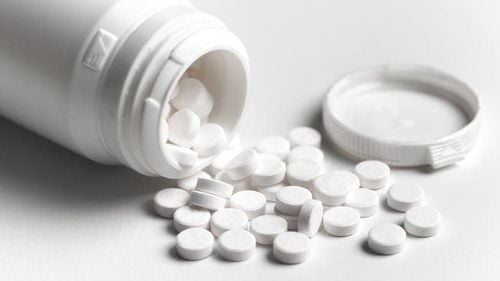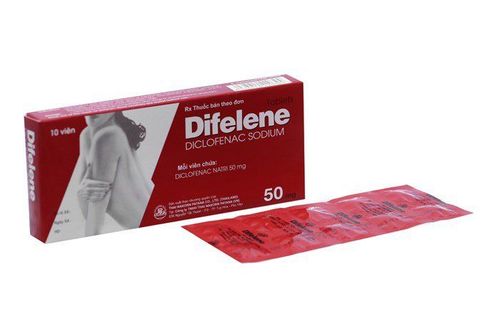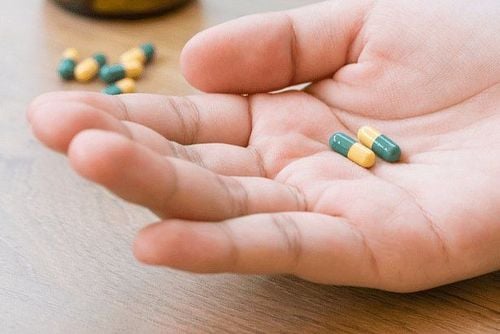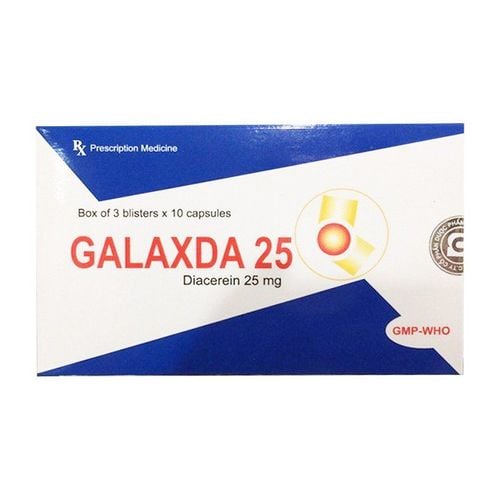This is an automatically translated article.
Sionara is a medication used to treat rheumatoid arthritis and osteoarthritis in adults. To use the drug safely and achieve the best treatment effect, users need to know the information about the drug before being prescribed.
1. What is Sionara?
Sionara is a pharmaceutical product manufactured and registered by Alembic Pharmaceuticals Limited, India.
Sionara belongs to the group of analgesics, antipyretics, non-steroidal anti-inflammatory drugs, for the treatment of Gout and joint diseases with the main active ingredient being Celecoxib 200mg. The drug is indicated for the treatment of rheumatoid arthritis and osteoarthritis in adults.
The drug is made in the form of hard capsules and packed according to the specifications of a large box containing 10 small boxes x 1 blister x 10 tablets, a box of 3 blisters x 10 tablets and a box of 1 blister x 10 tablets with each tablet containing 200mg of Celecoxib and other ingredients. other excipients are sufficient.
2. Uses of Sionara
2.1. Active ingredient Sionara Active ingredient celecoxib is a non-steroidal anti-inflammatory drug (NSAID) used to treat arthritis. Celecoxib blocks the enzyme that makes prostaglandins (a chemical that contributes to arthritis that leads to pain, heat, and redness in the joints), reducing prostaglandin levels. Thereby helping to reduce inflammation and reduce the accompanying redness, heat, and pain. Celecoxib differs from other NSAIDs in that celecoxib is less likely to cause ulcers in the stomach and intestines and does not interfere with blood clotting.
2.2. Indications for use Sionara Celecoxib is used to treat rheumatoid arthritis, osteoarthritis in adults.
2.3. Contraindications Sionara 200mg should not be used in one of the following cases:
Patients with a history of hypersensitivity to Celecoxib or other ingredients in the drug formulation. People who have an allergic reaction to the sulphamides. Patients with a history of urticaria, asthma or allergic reactions after taking aspirin or other non-steroidal anti-inflammatory drugs. People with active peptic ulcer disease or gastrointestinal bleeding. Patients with ischemic heart disease, cerebrovascular disease, peripheral vascular disease. Patients with congestive heart failure grade II-IV. Severe renal impairment with creatinine clearance less than 30 ml/min. Severe liver failure with plasma albumin less than 25g/l.
3. Usage and dosage of Sionara
Medicines are sold by prescription and only used when prescribed by a doctor. Therefore, patients should take the drug correctly and according to the dose prescribed by the doctor to ensure safety, limit side effects, bring effectiveness and avoid overdose.
Usage:
The drug is taken orally directly with cooled boiled water or filtered filtered water. The drug should be taken 30 minutes after a meal to avoid irritation and affect the stomach. Patients should take the tablets whole, do not break or crush or disperse the drug, which may affect the drug's composition. Do not take the drug with beer, wine, coffee, fruit juice, carbonated water, soft drink... because it can reduce the effectiveness of the drug. Dosage:
Osteoarthritis: Take 100mg x 2 times/day or 200mg x 1 time/day. Rheumatoid arthritis: Take 100-200mg x 2 times/day. Note: The above dosage is for reference only, the specific dose will be based on the patient's condition and the progression of the disease that the doctor will prescribe the appropriate dose.
4. Sionara drug side effects
Sionara 200mg medicine may cause some unwanted side effects for patients when used such as:
Common: Headache, dizziness, digestive disorders, constipation, enteritis, gastritis, inflammation bronchi, allergic reactions, anemia, hepatitis , jaundice. Rare: angioedema, anaphylaxis. These side effects are usually mild and go away when the medication is stopped. However, if the side effects become severe and persistent or you experience unusual symptoms not mentioned above. The patient should immediately notify the doctor or medical professional for advice and guidance on how to handle side effects promptly and effectively.
5. Drug interactions
Sionara may interact with other drugs when used concurrently. Drug interactions that occur can be antagonistic or synergistic, but all affect the effect and effectiveness of the drug.
Therefore, in order to avoid drug interactions, the patient should inform the doctor about the drugs they are taking, including medicines to treat diseases or herbs, functional foods to protect health... From there, the doctor The doctor will advise on the use of suitable alternative medicine or adjust the dose of the drug to the most appropriate and effective.
Sionara can interact with some drugs such as: Aspirin, Lithium, Fluconazole, Warfarin. Therefore, do not use Sionara with these drugs to avoid drug interactions that affect health and the treatment process.
6. Notes and cautions
When treating diseases with Sionara 200mg to achieve the best and safest effect, patients should also note:
The drug is only used when prescribed and prescribed by a qualified doctor. Therefore, patients need to take the drug exactly as prescribed by the doctor, absolutely do not arbitrarily calculate, change the dose of the drug, stop suddenly, stop taking the drug course without any indication. Caution should be exercised when using the drug in patients with hypertension, heart failure, dehydration, edema, asthma, cardiovascular disease, liver function test abnormalities. Should closely monitor complications of peptic ulcer, gastrointestinal bleeding, gastrointestinal perforation. It should be noted before using the drug for the elderly, children under 18 years old, people with kidney or liver failure, people with myasthenia gravis, stomach ulcers, liver coma... Consult your doctor before taking the drug for appropriate advice and indications. Women who are breastfeeding should weigh the risks and benefits for both mother and baby before taking the drug. The drug should only be used when absolutely necessary and must strictly follow the instructions of the doctor, if possible, should stop breastfeeding while taking the drug.
7. How to handle missed dose, overdose
Missed dose: Usually, the drug can be taken 1-2 hours apart from prescribed, so if you forget to take a dose, the patient should take a supplement as soon as he remembers. If the missed dose is close to the time for the next dose, take the next scheduled dose without skipping the missed dose. Do not double the dose or overlap the dose to avoid overdose or increase the side effects of the drug.
Overdose: Prescribed drugs need to be used according to the prescription, doctor's prescription and according to the manufacturer's instructions, do not arbitrarily increase the dose of the drug to avoid overdose. When overdosing and having suspicious symptoms, it is necessary to stop taking the drug and immediately notify the doctor or directly take the patient to a nearby medical center for emergency and timely treatment.
8. How to store medicine
Should store the medicine in a dry place with room temperature below 30 degrees Celsius, avoid moisture and avoid sunlight. Keep the medicine out of sight and reach of children and household pets.
Please collect and dispose of unused, expired drug packaging and medication according to the advice of your doctor, manufacturer and local waste disposal company. Note that the medicine should not be thrown into the toilet or flushed under the faucet of the family's daily life.
All information about Sionara medicine provided and shared in this article is for reference only, not for the purpose of professional medical diagnosis or treatment. Therefore, patients need to consult and use drugs as prescribed by a qualified doctor to achieve the best and safest treatment effect.













